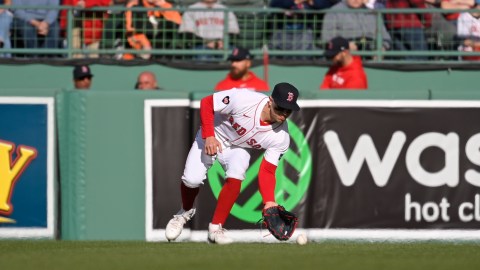 BOSTON — Jackie Bradley Jr.’s demotion to Triple-A Pawtucket was a long time coming.
BOSTON — Jackie Bradley Jr.’s demotion to Triple-A Pawtucket was a long time coming.
Bradley, batting .216 with a .288 on-base percentage in 112 games, has endured a disastrous season offensively for the Red Sox despite a surplus of highlight reel defensive plays. The writing was on the wall for a demotion, particularly during Boston’s most recent road trip, when Bradley’s playing time dipped amid an 0-for-35 slump.
“The move to send Jackie back to Pawtucket has been talked about for a little while now,” Red Sox manager John Farrell said before Monday’s game against the Los Angeles Angels at Fenway Park. “I think it’s important to note that this wasn’t reactionary. Had it been reactionary, you might suggest it (should have been) done a while ago.
“We felt like some of the adjustments that were being worked on had some evidence inside of given games. But we’re sending him out to maintain some of those adjustments, and that is to try to shorten down that swing a little bit more and have a more distinct two-strike approach.”
But why now?
Bradley collected two hits and reached base three times in Sunday’s series finale against the Houston Astros. He was 5-for-16 with two RBIs, two walks and four runs scored over his last five games, marking a step in the right direction following an awful stretch in which the 24-year-old looked completely lost at the plate.
Well, the answer is multilayered. The first — and most basic — explanation is that the Red Sox simply didn’t see enough consistency in Bradley’s offensive approach despite his mini resurgence over the weekend.
“We wanted some of that (pregame) work to see if it had a chance to play out here,” Farrell said Monday. “(We) felt like right now it was an opportunity to take advantage of the remaining three weeks left in the minor league season, hopefully to gain some confidence and some momentum when he comes back here. That’s the reason for now.”
The other ingredient in the timing of Bradley’s demotion involves his minor league options. Bradley, who hasn’t spent any time in the minors this season, has two options remaining. Farrell said Monday the club expects Bradley to return to Boston once rosters expand Sept. 1. If that’s the case, the Red Sox will have avoided using one of Bradley’s two remaining options, as he will have spent less than 20 days in the minors during the course of the season. The Red Sox, of course, could have sent him down earlier and brought him back within the 20-day window — thus still preserving the second option year — but making it so that Bradley can return within the 20-day window as part of September call-ups eliminates the need for a corresponding roster move.
There’s also Mookie Betts’ status. Betts, who was recalled Monday to take Bradley’s spot on the active roster, was optioned to Pawtucket following Boston’s Aug. 6 game. Since a player must remain in the minors for at least 10 days before being recalled, Saturday represented the earliest Betts could have been called back up to Boston.
As for why the Red Sox decided to send Bradley to Pawtucket at all, well, the proof is in the pudding. He’s obviously an exceptional (dare I say elite?) defender, but he’ll need to hit at least a little bit in order to carve out a successful major league career.
“We don’t view him as an extra outfielder, so we need to regain some of the consistency he showed through the minor league level and the performance history that’s there,” Farrell said, “and we’re doing what we can to get back to that.”
Bradley needs everyday at-bats to aid his development. He’ll now receive such — just not in Boston.




